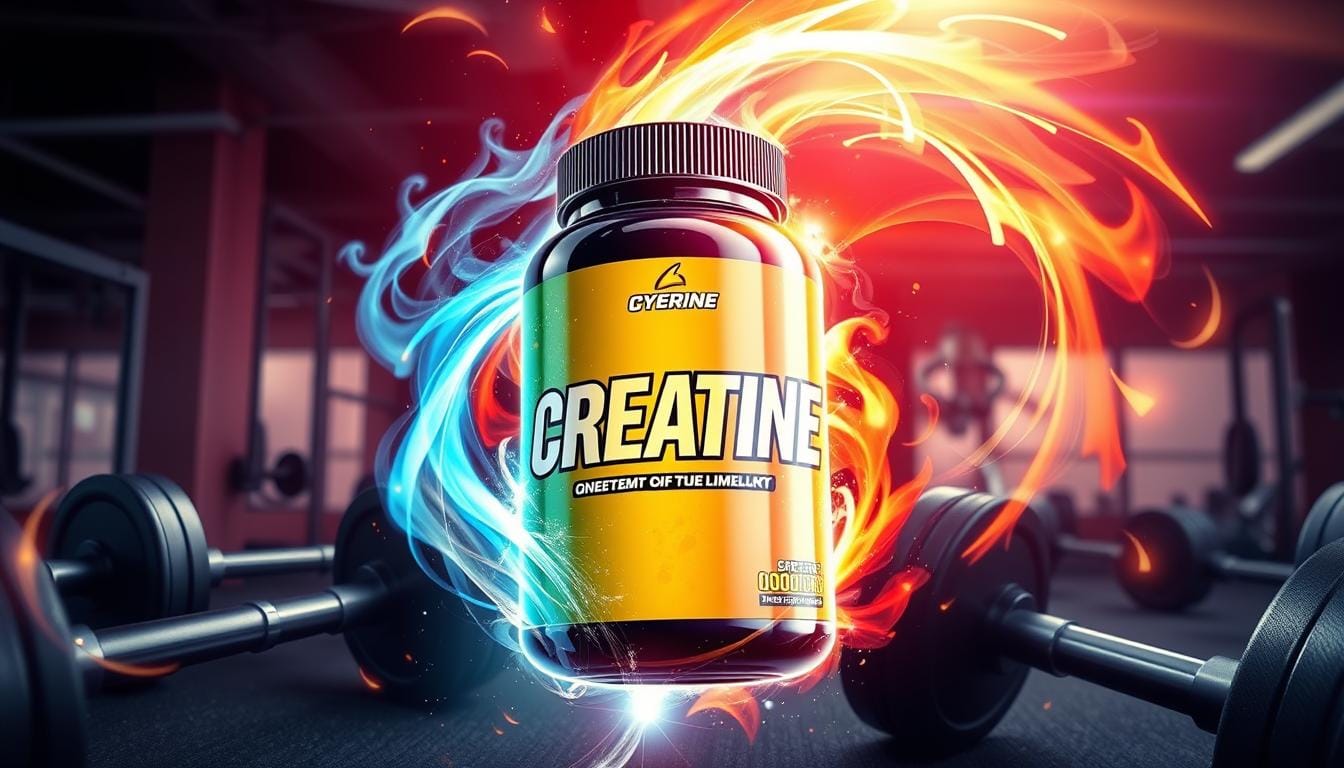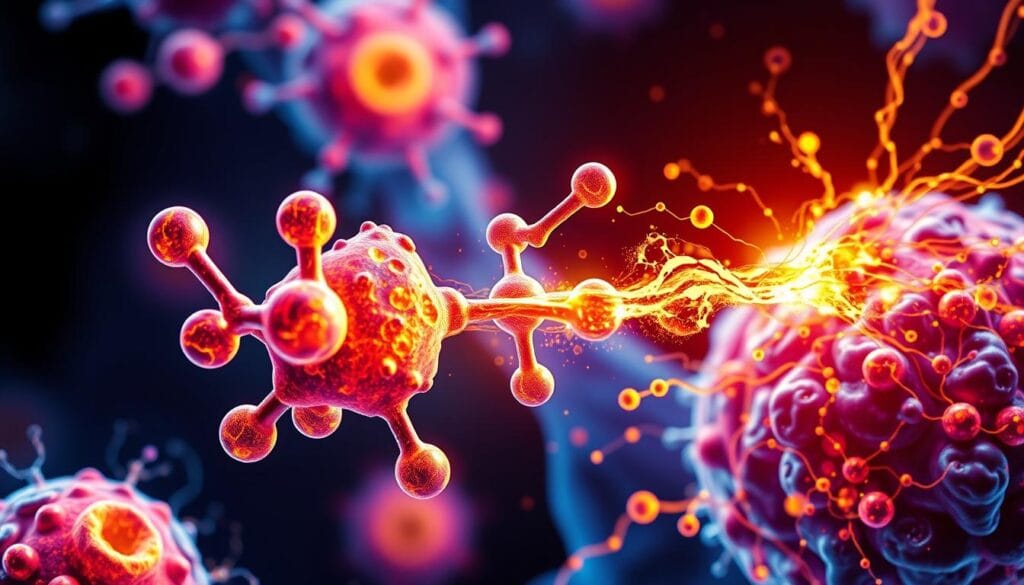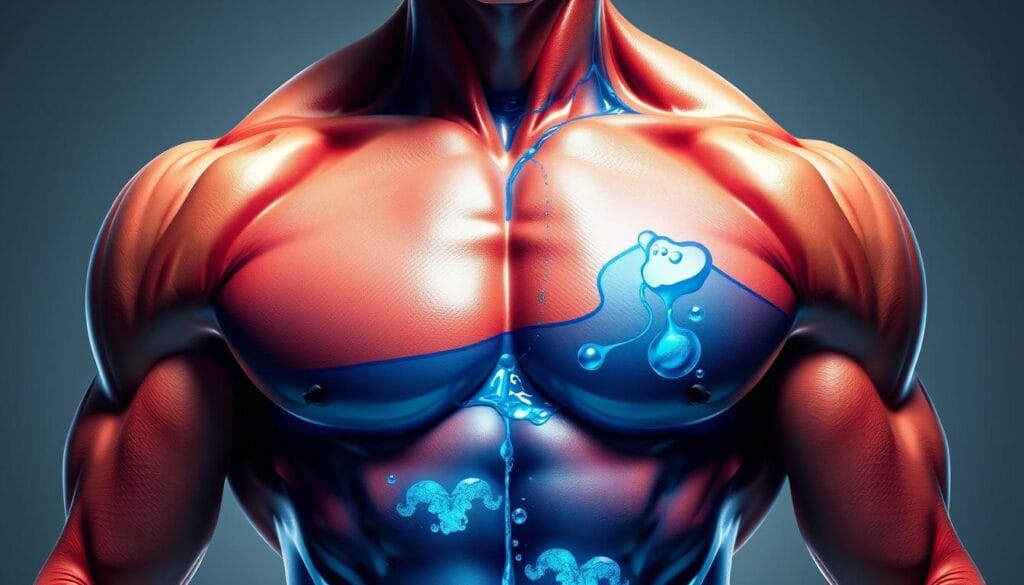Does Creatine Make You Gain Weight 01

Does Creatine Make You Gain Weight Starting your fitness journey, you might wonder about creatine’s weight gain effects. This topic often sparks curiosity and worry. But, the truth about creatine and weight gain is more complex than it seems.
In this guide, we’ll explore the science of creatine and how it affects weight. We’ll also clear up myths about this powerful supplement. Get ready to learn how creatine can change your body composition and help you achieve your fitness goals.
Table of Contents
Key Takeaways
- Creatine can cause a 2-4 pound weight gain at first because of water in muscles.
- This extra water is temporary and doesn’t mean you’re gaining fat.
- Creatine boosts energy and supports muscle growth with regular workouts.
- The amount of water weight gained can differ based on your body weight.
- Long-term use of creatine doesn’t lead to permanent water retention, only muscle growth.
READ MORE : Kelly Clarkson’s Weight Loss Journey: How She Lost 60 Pounds
Understanding Creatine and Its Role in the Body
Creatine is a natural compound that helps your body make energy. It’s made in the liver, pancreas, and kidneys. Then, it’s stored in your muscles as phosphocreatine.
This stored phosphocreatine helps make ATP, a key energy molecule in your muscles.
Natural Production of Creatine
Your body makes creatine from amino acids like glycine, arginine, and methionine. This process keeps your muscles ready for intense exercise. The amount of creatine your body makes depends on your muscle mass, diet, and health.
How Creatine Works in Muscle Cells
During intense exercise, your muscles use up ATP fast. Creatine helps by turning ADP back into ATP. This is called the creatine-phosphate shuttle.
It keeps your muscles energized for workouts and daily tasks.
Sources of Dietary Creatine
You can also get creatine from food. Red meat and fish like beef, salmon, and tuna are good sources. Eating these foods can boost your creatine levels and support your muscles.
“Creatine supplementation can be a game-changer for athletes and fitness enthusiasts looking to enhance their performance and muscle development.”
Knowing how creatine works in your body helps you decide if you should add it to your diet or supplements. It could improve your health, fitness, and even Kelly Clarkson’s weight loss journey.
Initial Weight Gain: Water Retention Explained
When you start taking creatine, you might see your weight go up. This increase is mostly water, not fat. Creatine pulls water into your muscles, making them bigger. This makes your body hold more water, causing a temporary weight gain.
Studies show that taking more creatine at first can fill your muscles with water. This can make your muscles hold up to 40% more creatine. This leads to a 1-2% increase in body weight, but it’s just water.
But don’t worry, this water effect doesn’t last long. Long-term use of creatine doesn’t keep water in your muscles. The water helps with exercise, like cooling down and getting nutrients.
To avoid bloating, drink lots of water, at least 8-10 glasses a day. Choosing creatine monohydrate might also help with water retention.
In short, the first weight gain from creatine is normal and temporary. It makes your muscles more hydrated. This can improve your performance and help with muscle recovery, without adding fat or weight in the long run.
Does Creatine Make You Gain Weight?
Many people talk about the weight gain from creatine. It’s true that creatine can cause weight changes. But, it’s important to know why this happens.
Distinguishing Between Water Weight and Fat Gain
The weight gain from creatine is mostly water, not fat. Creatine pulls more water into your muscles. This makes you weigh more, but it’s not fat. This extra water can go away when you stop taking creatine or change your diet and hydration.
Timeline of Weight Changes
- Most people gain 2-4 pounds in the first week of creatine.
- You’ll see real muscle growth and body changes in 6-8 weeks of daily use.
- Water weight changes happen fast, but muscle and fat changes take longer.
Factors Affecting Weight Gain
Many things can change how much weight you gain from creatine. Your workout, diet, and how your body reacts are key. Drinking plenty of water, watching your calories, and adjusting your workout can help with weight changes.
| Factor | Impact on Weight Gain |
|---|---|
| Water Intake | More water can reduce water retention and weight gain |
| Calorie Intake | Eating too many calories can lead to fat gain, even with creatine |
| Exercise Routine | Regular intense workouts help grow muscle and avoid fat gain |
The weight changes from creatine involve water, muscle, and body changes. Knowing this can help you set realistic goals and get the best results.
Creatine’s Impact on Muscle Mass Development
Creatine is a popular supplement for building muscle growth and boosting strength gains. Many studies show its benefits when used with resistance training. It’s especially helpful for vegetarians and vegans, helping them increase lean muscle mass and improve their body image.
Creatine boosts phosphocreatine levels in muscles. This helps the body make more ATP, the main energy source for intense workouts. With more energy, people can exercise harder, leading to more muscle growth and strength gains.
It also aids in muscle recovery after tough resistance training sessions. Creatine might even help muscles grow more when taken before or after workouts.
| Creatine Supplement Benefits | Supported by Research |
|---|---|
| Increases muscle growth and strength | ✔ |
| Enhances high-intensity exercise capacity | ✔ |
| Promotes faster muscle recovery | ✔ |
| May enhance muscle protein synthesis | ✔ |
Creatine is a well-studied supplement that boosts muscle growth, strength gains, and lean muscle mass with resistance training. It improves workout performance and helps muscles recover faster. This makes it a great choice for those looking to enhance their fitness and body image.
The Science Behind Creatine and Water Retention
Understanding the link between creatine and weight gain involves water retention. Creatine, found in muscles, boosts hydration and energy. It pulls water into muscles through osmosis, increasing muscle size and body water.
Osmotic Properties of Creatine
During the “loading phase,” people take 20-25 grams of creatine daily for 5-7 days. This boosts muscle creatine levels, causing a temporary 1-2% body mass increase.
Cell Volumization Effects
Creatine boosts muscle size and strength by improving hydration and energy. It can double muscle growth and enhance exercise performance by up to 15%.
Long-term studies show creatine doesn’t cause excessive water retention. Water balance stays stable, with no significant changes in body water over time.
| Dosage and Duration | Impact on Water Retention |
|---|---|
| 20-25 grams per day for 5-7 days (loading phase) | Temporary 1-2% increase in body mass due to water retention |
| 0.03 grams per kilogram of body weight per day for 6 weeks | No significant changes in total body water |
| 0.3 grams per kilogram of lean mass for 5 days, followed by 0.075 grams per kilogram of body weight per day for 42 days | No changes in total body water |
| 28 days of creatine supplementation | Increase in body mass and total body water, but no changes in extracellular or intracellular water |
In summary, creatine’s osmotic properties draw water into muscles, causing a temporary increase in muscle size and body water. However, long-term use doesn’t lead to excessive water retention, keeping water balance stable.
Different Types of Creatine and Their Effects on Weight
Choosing a creatine supplement can be tough. You have options like creatine monohydrate, creatine ethyl ester, and creatine hydrochloride. Each has its own benefits and effects on weight. Knowing the differences can help you pick the right one for your fitness goals.
Creatine Monohydrate: The Gold Standard
Creatine monohydrate is the top choice for many. It’s been studied a lot and boosts muscle growth, strength, and performance. It’s also affordable, making it popular among athletes and fitness fans.
Exploring Other Creatine Types
- Creatine Ethyl Ester: It’s said to be more bioavailable, but studies don’t show it’s better than creatine monohydrate for muscle creatine.
- Creatine Hydrochloride: It’s thought to improve sports performance, but there’s no solid proof it’s more effective than other creatines.
- Buffered Creatine Monohydrate: It’s claimed to be better absorbed, but research shows no big difference in muscle creatine levels compared to regular creatine monohydrate.
While other creatines have unique features, creatine monohydrate’s benefits on weight gain are well-studied. The research on these alternatives is still limited.
| Creatine Type | Potential Effects on Weight |
|---|---|
| Creatine Monohydrate | Proven to increase muscle mass and water retention, leading to short-term weight gain. |
| Creatine Ethyl Ester | Limited research on its effects on weight, with no clear advantages over creatine monohydrate. |
| Creatine Hydrochloride | Insufficient evidence on its impact on weight gain, with mixed results compared to other creatine forms. |
| Buffered Creatine Monohydrate | Minimal difference in weight gain compared to traditional creatine monohydrate, according to available studies. |
When picking a creatine supplement, look at third-party certifications, ingredient transparency, and cost. This ensures you’re making a smart choice that fits your fitness goals and budget.
Proper Dosage and Timing for Optimal Results
To get the most out of creatine, it’s important to follow the right steps. This means starting with a loading phase and then moving to a maintenance dose. Let’s look at how to do each part right to get the best results.
Loading Phase Guidelines
The loading phase is all about quickly filling your muscles with creatine. You’ll need to take 20-25 grams of creatine each day, spread out in 4-5 doses. Keep up this high amount for 5-7 days to make sure your muscles are fully loaded.
Maintenance Phase Recommendations
After the loading phase, switch to a maintenance dose of 3-5 grams of creatine daily. This lower dose helps keep your muscles at the high levels reached during the loading phase. Studies show that sticking to this dose for at least 4 weeks can lead to more muscle and strength.
Keep in mind, how you respond to creatine can differ. Your weight and workout routine might affect the best dose for you. Always talk to a healthcare expert before starting creatine.
“Consistent creatine supplementation, combined with a proper exercise routine, can be a game-changer in your fitness journey. By following the right dosage protocol, you’ll be on your way to maximizing your muscle growth and performance potential.”
Remember, patience and motivation are key when using creatine. Stick to the loading phase and maintenance dose to reach your fitness goals.
Debunking Common Myths About Creatine and Weight Gain
Creatine is a popular sports supplement, but it’s filled with myths. Let’s explore some common myths about creatine and weight gain.
Myth: Creatine Causes Kidney Damage
Many believe creatine harms the kidneys. But, studies show it’s safe for healthy people at recommended doses. A study in the Journal of Sports Science & Medicine found no kidney or liver damage from creatine.
Myth: Creatine Leads to Dehydration and Muscle Cramps
Some think creatine causes dehydration and muscle cramps. But, science says it doesn’t. Creatine might even help prevent dehydration and muscle cramps during workouts.
Myth: Creatine Causes Fat Gain
Many believe creatine leads to fat gain. But, it’s not true. Any weight gain from creatine is from more muscle and water, not fat. Studies show no difference in body fat between creatine users and non-users.
To stay healthy and reach your fitness goals, eat well, exercise regularly, and drink plenty of water. Adding creatine to your routine can help grow muscles and improve performance safely, without myths.
| Myth | Fact |
|---|---|
| Creatine causes kidney damage | Research shows no link between creatine and adverse effects on kidney or liver function |
| Creatine leads to dehydration and muscle cramps | Creatine may have a hyper-hydrating effect, potentially preventing dehydration and muscle cramps |
| Creatine causes fat gain | Weight gain from creatine is due to increased muscle mass and water retention, not fat accumulation |
“Creatine is one of the most thoroughly researched and effective supplements available, with numerous studies supporting its benefits for athletic performance and muscle growth.”
Safety Considerations and Potential Side Effects
When it comes to creatine supplements, safety is key. Creatine is usually safe at the right doses. But, it’s good to know about possible side effects and who should not take it.
Who Should Avoid Creatine
People with kidney issues, pregnant or nursing moms, and those with serious health problems should talk to a doctor before using creatine. Kids and teens should not take creatine because we don’t know how it affects their growing bodies yet.
Monitoring Your Body’s Response
Start by watching how your body reacts to creatine. Look for changes in weight, how much water you drink, and any odd symptoms. Side effects like stomach problems, muscle cramps, or dehydration might happen, especially if you take too much.
Stick to the recommended dose and pick high-quality, certified creatine supplements. This can help avoid side effects. If you notice any bad symptoms, stop taking it and see a doctor.
“Creatine supplements are generally considered safe when taken at recommended doses, but it’s important to be mindful of any unusual side effects and to consult a healthcare professional, especially if you have pre-existing medical conditions.”
Knowing the safety tips and watching how your body reacts can help you use creatine safely. This way, you can add it to your health and fitness plan without worries.
Combining Creatine with Exercise for Best Results
Creatine works best when you do resistance training and high-intensity exercises. Adding creatine to your workout can boost your performance, increase muscle, and speed up recovery. It helps reduce muscle damage, soreness, and inflammation after hard workouts.
It also helps you handle intense training, even in hot weather. Athletes might get fewer injuries and heal faster. Creatine and resistance training can even strengthen bones, lowering osteoporosis risk.
Keep an eye on your progress and adjust your workout as needed. Notice the early gains from creatine and tailor your routine for strength and muscle growth. Creatine and intense exercise together can help you reach your goals and see amazing weight loss stories.








